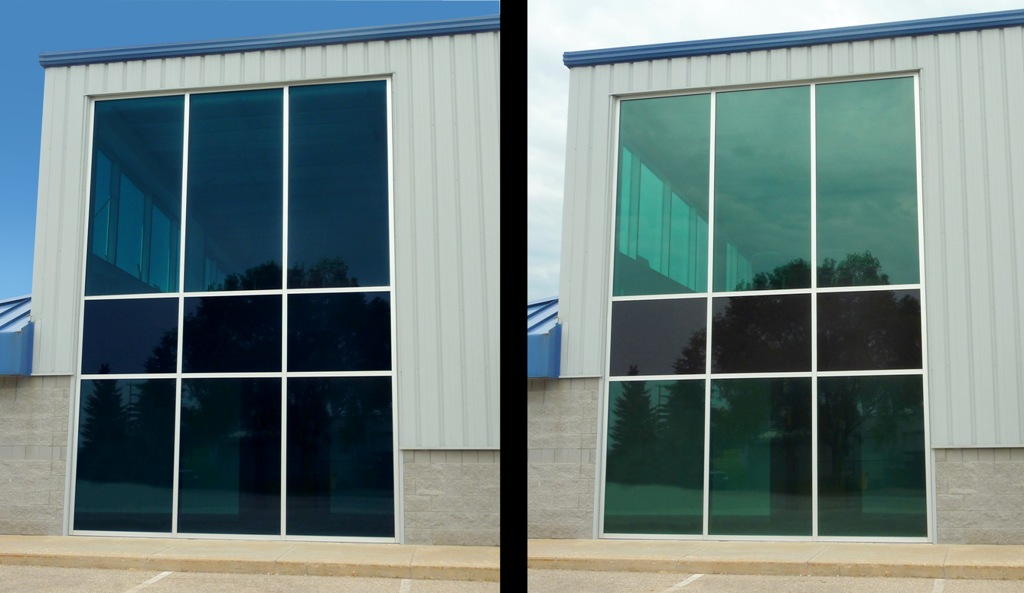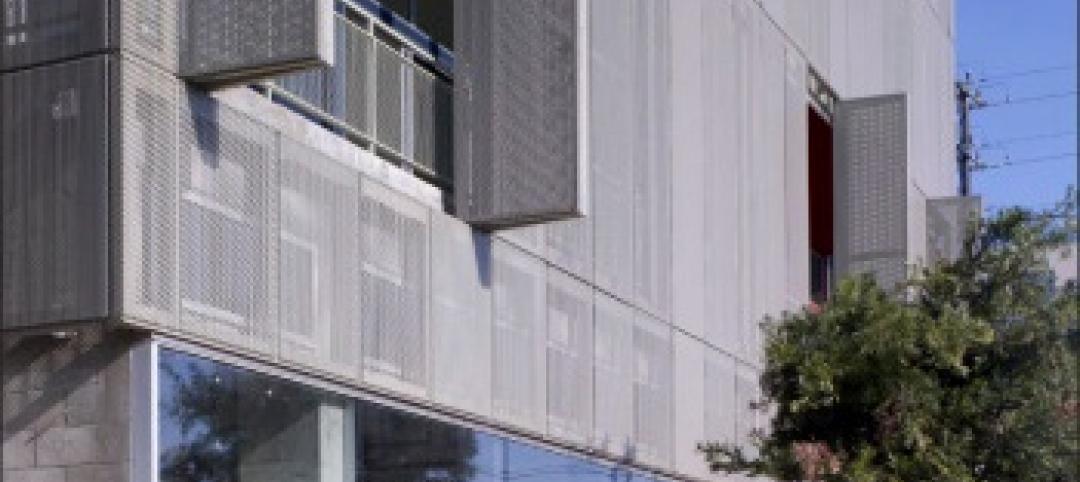PPG Industries and Pleotint, LLC, have agreed to jointly market a commercial window glass system that combines Sunlight Responsive Thermochromic, or SRT, interlayer technology by Pleotint, with Solarban low-emissivity (low-e) glass and other glasses by PPG to control solar heat gain and reduce energy costs in buildings.
Pleotint’s patented technology is a lightly tinted thermochromic interlayer that warms up and darkens in direct sunlight, but clears in indirect sunlight to allow light to pass into a building. Laminated between two lites of glass, SRT interlayer may be used monolithically or within an insulating glass unit. Visible light transmittance for windows with SRT interlayer adjusts through the day without the need for wiring, power supplies or controls.
When the SRT interlayer is combined in a window system with Solarban glass, a proven solar control, low-e glass that also blocks solar heat and transmits visible light, these adaptive windows can dramatically reduce the amount of energy required to cool buildings. Because the windows clear up in indirect sunlight, they also decrease the need for artificial lighting.
A study showed that, due to its ability to dynamically adjust to natural lighting conditions, a window system including an SRT interlayer can reduce energy costs in commercial buildings by 17 to 30% over industry-standard window systems. A window with SRT technology also reduces the transmittance of ultraviolet light and short-wavelength visible light, which are major contributors to fading in carpets, fabrics, artwork, photos and other materials.
Unlike competing dynamic windows that require manual, electrical or mechanical controls, windows with the SRT interlayer use the sun’s own energy – up to 1,000 watts of power per square meter – to adjust the window tint and transmittance level. Because the process is entirely self-sustaining, the SRT interlayer system not only uses less energy, it also eliminates the opportunities for failure due to faulty wiring, poor connections or broken electrical circuits. Windows with SRT interlayers also have passed exposure and durability testing developed for electrochromic windows and conducted by the National Renewable Energy Laboratory (NREL).
Insulating units with SRT interlayers and Solarban low-e glass are available in sizes up to 5 feet wide and have been laminated in lengths of up to 11 feet. Architects may specify any Oceans of Color tinted glass or Earth and Sky high-performance tinted glass by PPG as a base-state window color. BD+C
Related Stories
| Apr 26, 2011
Video: Are China's ghost cities a bubble waiting to burst?
It's estimated that 10 new cities are being built in China every year, but many are virtually deserted. Retail space remains empty and hundreds of apartments are vacant, but the Chinese government is more concerned with maintaining economic growth—and building cities is one way of achieving that goal.
| Apr 25, 2011
Earn $300 million by NOT hiring Frank Gehry
An Iowa philanthropist and architecture aficionado—who wishes to remain anonymous—is offering a $300 million “reward” to any city anywhere in the world that’s brave enough to hire someone other than Frank Gehry to design its new art museum.
| Apr 20, 2011
Marketing firm Funtion: to host “Construct. Build. Evolve.”
Function:, an integrated marketing agency that specializes in reaching the architecture, building and design community, is hosting an interactive art event, “Construct. Build. Evolve.” in Atlanta’s Piedmont Park on Thursday April 21, 2011 at 11:00AM EDT. During the event attendees will be asked to answer the question, “how would you build the future?” to rouse dialogue and discover fresh ideas for the future of the built environment.
| Apr 20, 2011
Architecture Billings Index: new projects inquiry index up significantly from February
The American Institute of Architects (AIA) reported the March ABI score was 50.5, a negligible decrease from a reading of 50.6 the previous month. This score reflects a modest increase in demand for design services (any score above 50 indicates an increase in billings). The new projects inquiry index was 58.7, up significantly from a mark of 56.4 in February.
| Apr 19, 2011
What are the 15 most-watched construction and engineering stocks?
According to Motley Fool, a multimedia financial services company, the most-watched construction and engineering stock is Fluor (NYSE: FLR), which ranks #1 on BD+C’s Giants 300 engineering list with $1.994 billion in revenue in 2009. Check out the 14 other most-watched A/E stocks.
| Apr 19, 2011
AIA announces top 10 green Projects for 2011
The American Institute of Architects Committee on the Environment announced its Top 10 Green Projects for 2011. Among the winners: Cherokee Studios in Los Angeles, the Department of Energy's National Renewable Energy Laboratory in Golden, Colo., and the Vancouver Convention Centre West in Vancouver, British Columbia.
| Apr 18, 2011
Greening and Upgrading Today’s Vertical Transport Systems
Earn 1.0 AIA/CES HSW/SD learning units by studying this article and passing the online exam.
| Apr 14, 2011
U.S. embassies on a mission to green the world's buildings
The U.S. is putting greater emphasis on greening its worldwide portfolio of embassies. The U.S. State Department-affiliated League of Green Embassies already has 70 U.S. embassies undergoing efforts to reduce their environmental impact, and the organization plans to increase that number to more than 100 by the end of the year.
| Apr 14, 2011
How AEC Professionals Choose Windows and Doors
Window and door systems need to perform. Respondents to our annual window and door survey overwhelmingly reported that performance, weather resistance, durability, and quality were key reasons a particular window or door was specified.













